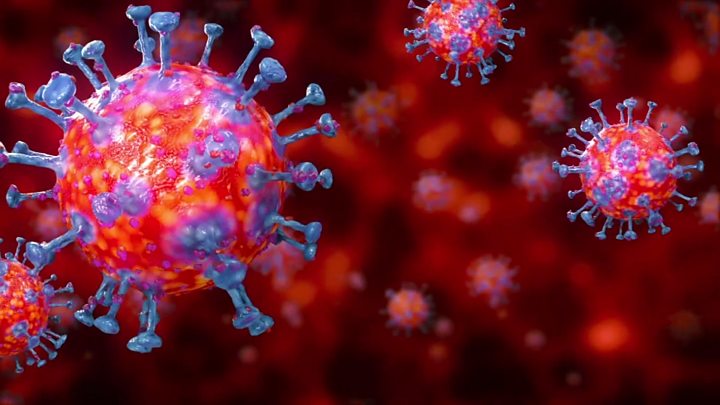Deaths from coronavirus in Spain surged to 491 on Tuesday from 309 the day before, health officials have said.
The number of confirmed cases also soared by 2,000 to 11,178, as Spain closed its borders and maintained a partial lockdown on 47 million people.
Death tolls have increased elsewhere, with Iran reporting 135 more, taking its official total close to 1,000.
The EU planned to ban all non-essential travel from outside the bloc, as France started its own strict lockdown.
The EU ban, which applies across Europe's Schengen free-travel zone, will be in place for at least 30 days. It will affect all foreign visitors except long-term residents, family members of EU nationals and diplomats, cross-border and healthcare workers, and people transporting goods.
EU leaders will discuss the measures via videoconference later on Tuesday. Meanwhile, the Euro 2020 football competition has been postponed by a year.
French citizens who leave home must now carry a document detailing the reasons why, with fines for transgressors.
In Britain, people have been told to avoid social contact, work from home if they can and avoid all non-essential foreign travel.
The latest World Heath Organization (WHO) figures list 173,000 infections globally and 7,000 deaths.
What is the latest from Spain?
Spanish Prime Minister Pedro Sanchez has announced a package of measures worth €200bn euros (£182bn), made up of loans, credit guarantees, benefits and direct aid, to mitigate the impact on the economy.
The package represents about 20% of the country's gross domestic product, Mr Sanchez said, adding that the government would mobilise €117bn euros for the package, with the rest to come from private companies.
The measures include €100bn in state-backed credit guarantees and unlimited liquidity lines for companies.
At midnight Spain began stopping cars crossing its borders from France and Portugal. Only Spanish nationals, residents and cross-border workers were being allowed in.
Train services are also affected and the interior ministry has not ruled out closing airspace and sea traffic.
Madrid remains the area with the highest number of cases – 4,871 – with Catalonia next on 1,394.
Some 1,028 people are listed as having recovered from the Covid-19 disease.
El Pais reports that the the government of the Balearic Islands has asked the 25,000 tourists who are still on the islands to leave and return home.
Spanish media are also reporting that 19 people have died at a care home for the elderly in Madrid where dozens of cases have been recorded.
What is France doing?
President Emmanuel Macron has ordered people to stay at home and only go out for essential trips.
The decree came into effect at 11:00 local time (12:00 GMT) on Tuesday. Mr Macron said the previous measures, including the closing of schools, cafes and non-essential shops, had proven insufficient.
Media playback is unsupported on your device
His 20-minute televised address on Monday was watched by a record 35.3 million people, Le Monde reported, with 96% of viewers watching live.
"We are at war… we're fighting neither another army nor our own nation. But the enemy is here, invisible, untouchable… and is advancing," he said.
Citizens must carry a form spelling out their reasons for travel and the fine for transgressors will be set soon at €135 ($150; £123).
Some 100,000 civil servants and soldiers will be deployed nationwide to carry out checks.
On Tuesday, Finance Minister Bruno Le Maire unveiled a €45bn ($50bn; £41bn) aid package to help businesses and affected employees. He said he was ready to use nationalisation if necessary.
France has so far registered more than 6,000 infections and 148 deaths.
What is the latest in Iran?
It remains the world's third-worst-affected nation, after China and Italy.
More than 16,000 people are confirmed as infected and 988 have died, although some analysts believe the figures are far higher than officially reported.

Media playback is unsupported on your device
A spokesman for the judiciary said on Tuesday that 85,000 prisoners, including political prisoners, had been temporarily released to try to combat the spread.
Gholamhossein Esmaili did not say when or how those freed would be returned to prison, but stressed that only prisoners serving five years or less had been released.
Most shops and restaurants remain open but the health ministry has urged people to stay at home.
The latest news elsewhere outside Europe:
- Voting on Tuesday in the Democratic primary in the US state of Ohio has been postponed, although voting is set to go ahead in Arizona, Florida, and Illinois
- President Donald Trump said the coronavirus emergency could last until the end of the summer or even longer, and that over the next 15 days Americans should not gather in groups of more than 10 and should avoid bars, restaurants, food courts, gyms and crowds
- China reported just one new domestic infection on Tuesday – but 20 more from people arriving from abroad. It also said it "strongly opposed" Mr Trump's reference in a tweet to the "Chinese virus"
- The Philippines became the first nation to shut its stock exchange indefinitely
- Malaysia is barring people crossing the border with Singapore from Wednesday, sparking a rush on foRead More – Source



